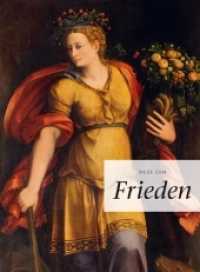- ホーム
- > 洋書
- > 英文書
- > Literary Criticism
Full Description
This is an accessible exploration of the cult TV show "Lost", looking particularly at its fascinating use of novels, plays, stories, and other literary texts. From the moment that Watership Down made its appearance on screen in season one, speculation about "Lost"'s literary allusions has played an important role in the larger discussion of the show. Fans and critics alike have noted the many references, from biblical passages and children's stories to science fiction and classic novels. "Literary Lost" teases out the critical significance of these featured books, demonstrating how literature has served to enhance the meaning of the show. It provides a fuller understanding of "Lost" and reveals how television can be used as a tool for stimulating a deeper interest in literary texts. The first chapter features an exhaustive list of '"Lost" books', including the show's predecessor texts. Subsequent chapters are arranged thematically, covering topics from free will and the nature of time to parenthood and group dynamics.
From Lewis Carroll's creations, which appear as recurring images and themes throughout, to Slaughterhouse-Five's lessons on the nature of time, "Literary Lost" will help readers unravel the show's novelistic plot while celebrating its astonishing layers and nuances of text.
Contents
Introduction "What, Don't You Read?": Lost's Literary Influence; Chapter 1: The Books of Lost; Chapter 2 "Are You There, God?": Faith, Sacrifice and Redemption; Chapter 3: Who Has the "Power Over the Clay"? Purpose, Fate and Free Will; Chapter 4 Stuck and "Unstuck" in Time: a Tradition of Time Travel; Chapter 5 "Fathers, provoke not your children to wrath": Lost Parents; Chapter 6 "We're All Mad Here": Dreams, Illusions and the Nature of Reality; Chapter 7 "Maybe there is a beast....maybe it's only us": Group; Dynamics and the Communities of Lost; Chapter 9 A Conclusion: The Purpose of "Stories that Aren't Even True"; Appendix 1; Bibliography; End Notes.








